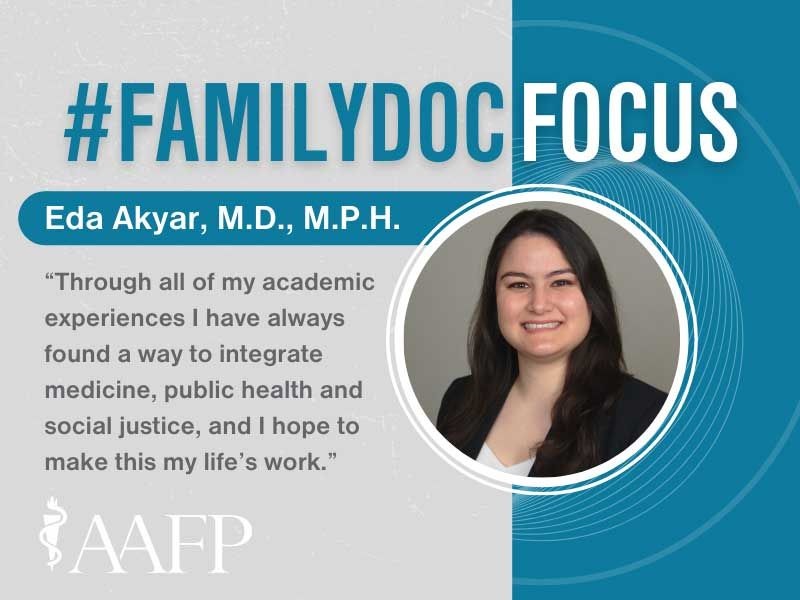Serving the Underserved Is Resident’s Calling
May 17, 2022, 11:33 a.m. David Mitchell — Eda Akyar, M.D., M.P.H., had just started her ICU rotation at Loyola University’s Stritch School of Medicine when the COVID-19 pandemic hit Chicago. Medical students were pulled from their rotations, but Akyar wasn’t about to sit on the sidelines.

“I saw there was a great need for help,” said Akyar, who witnessed overwhelmed nurses who were flooded by calls from a patient hotline while also trying to fulfill their other duties. “I created a script and recruited other medical students to run the COVID hotline. This work, for me and for the other medical students, allowed us to serve our community even though we couldn’t be on the floors helping and learning in the ways that we wanted. It was a great leadership experience.”
The students worked with Loyola’s infection control team and hospital leadership to identify community needs and stay abreast of rapidly changing guidance. Students filled that role for about three weeks until the hotline work could be transitioned to other staff, and students were transitioned to virtual learning.
Akyar found another opportunity to help her community combat COVID after she graduated in January 2021.
“I had a little bit of time before starting residency, and I couldn’t sit still,” said Akyar who went to work as a public health administrator for the Chicago Department of Public Health on issues related to vaccination and testing in nursing homes. “I wanted to be involved in any way I could. It was a great way to integrate my skills in medicine and public health and serve as a voice for those living and working in nursing homes. Both populations had very specific needs at such a stressful time.”
Akyar is now a first-year family medicine resident at New York-Presbyterian Hospital - Columbia University Irving Medical Center, but she is still working on public health issues in Chicago as one of the founding board members of the Chicago Refugee Coalition.
If a medical student doesn’t seem like an obvious choice for such a role, consider Akyar’s many stops on her circuitous route to medical school. She has years of experience, starting in high school, as a mentor to newly arrived refugees with the International Rescue Committee. As an undergraduate at Carnegie Mellon University, she started and led her school’s chapter of Global Medical Brigades. That role included leading, planning and fundraising for three medical trips to underserved areas in Latin America.
After completing her undergraduate degree, she spent a year teaching English in Indonesia in the U.S. State Department’s Fulbright program. Before beginning medical school, she earned her master’s degree in public health from Yale, where she was involved in the Global Health Justice Partnership, which brings together the university’s schools of public health, medicine and law with numerous outside stakeholders.
“I think my leadership skills, fundraising experience and the knowledge that comes with my training in public health and medicine offers a very unique perspective,” said Akyar, who has served on the refugee coalition’s board since 2019.
The coalition helps refugees with issues like food security, clothing, legal referrals and financial literacy. The organization hopes to launch a child care center by January that would employ refugees and fill a need for parents who work at night.
“Refugees typically work shift-work, so the hours of the traditional child care system don’t work to their favor,” said Akyar, who is working to help the coalition understand the financial needs of the center. “Our center will offer extended hours to accommodate the flexible work hours of refugee parents. Cost is another big barrier. We aim to offer free services to all refugee children in our center. We are hoping we’ll make a big impact within the Rogers Park neighborhood of Chicago, which is where most refugees are resettled within the city.”
The United Nations estimated in 2020 that there were approximately 80 million displaced people worldwide, including 26.3 million who were formally designated as refugees. The United States has admitted 3.1 million refugees since 1980, according to the State Department.
Akyar said she feels a “strong connection to the underserved, specifically refugees and to immigrant populations” because her own parents immigrated from Turkey. Her mother completed her training as an internal medicine physician in her native country, but she had to learn a new language and complete a U.S. residency program before she could practice here. The process took roughly a decade.
“I’m very proud of my parents and grateful for all of the sacrifices they made in pursuit of creating a better life for my sister and me,” said Akyar, whose twin sister, Serra Akyar, M.D., M.P.H., is a psychiatry resident at Northwell Health-Staten Island University Hospital in New York City. “I think many of the struggles that I see within my own patient population here — which is a predominantly underserved group — and many of the struggles that I’ve seen refugees experience are obstacles that I have seen both of my parents experience with language, understanding culture, health systems and the process of going through school here. It’s very different from what they experienced in Turkey.”
Akyar is one of this year’s AAFP Health Equity Fellows. Her project is focused on mental health inequities in the Washington Heights area where her residency program is located. The neighborhood is predominantly Latino, and studies have shown that Latinos access mental health care at about half the rate of the U.S. non-Latino white population.
“The goal is to identify what the issues are, come up with solutions that are practical and community supported and then advocate for those needs with the local government,” she said. “Serving the underserved, I believe, is my life’s calling. Through all of my academic experiences I have always found a way to integrate medicine, public health and social justice, and I hope to make this my life’s work.”